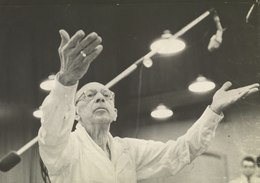The Flood (Stravinsky)
| The Flood | |
|---|---|
| A musical play by Igor Stravinsky | |
 Stravinsky in 1962 | |
| Librettist | Robert Craft |
| Language | English |
| Based on | Noah and the Flood, mystery plays |
| Premiere | 1962 Santa Fe Opera |
The Flood: A musical play (1962) is a short biblical drama by Igor Stravinsky on the story of Noah and the flood, originally conceived as a work for television. It contains singing, spoken dialogue, and ballet sequences. It is in Stravinsky's late, serial style.
The work was premiered in the United States on the CBS Television Network on 14 June 1962, a production conducted by Robert Craft and choreographed by George Balanchine. Dramatic actors participating in the work included Laurence Harvey (narrator), Sebastian Cabot (Noah), and Elsa Lanchester (Noah's wife, which Lanchester played with a Cockney accent). Robert Craft also conducted the first staged performance, by the Santa Fe Opera in New Mexico in 1962,[1] and again in Hamburg on 30 April 1963.
Text[]
The narrative of The Flood juxtaposes the story of the Creation with that of Noah. The text was compiled by Robert Craft using material from Genesis and the York and Chester cycles of mystery plays. Excerpts from the Te Deum are sung by the chorus.
Scoring[]
The work is scored for tenor soloist (Lucifer/Satan), two bass soloists (God), several spoken parts (a narrator, Satan, Eve, Noah, a caller, Noah's wife, son of Noah), chorus (SAT) and a large orchestra of 3 flutes (3rd doubling piccolo), alto flute, 2 oboes, cor anglais, 2 clarinets, bass clarinet, contrabass clarinet, 2 bassoons, contrabassoon, 4 horns, 3 trumpets, 3 trombones (1st doubling alto trombone), tuba, timpani, bass drum, cymbals, xylorimba, 3 tom-toms, harp, celesta, piano and strings.
The Flood was published in 1963 by Boosey & Hawkes.
Structure[]
The work is in seven parts:
- Prelude
- Melodrama
- The building of the Ark (choreography)
- The catalogue of the animals
- The comedy (Noah and his wife)
- The Flood (choreography)
- The covenant of the rainbow
Recordings[]
- The original cast recording, with Robert Craft conducting (in the composer's presence) the Columbia Symphony Orchestra and Chorus, recorded in 1962 for Columbia Masterworks Records, released on CD by Sony Classical Records (SM2K 46300)
- Oliver Knussen conducting the London Sinfonietta on Deutsche Grammophon (DG 447 068-2, released 1995)
References[]
- ^ Walsh, Stephen (2008). Stravinsky: The Second Exile: France and America, 1934-1971. Berkeley: University of California Press. p. 459. ISBN 9780520256156.
Cited sources[]
- Phillip Ramey: Liner notes to Igor Stravinsky Edition, vol. X: Oratorio and Melodrama (Sony Classical SM2K 46300)
- Boosey & Hawkes' information about the score. Retrieved August 16, 2007
- Holman, J. K. (ed.) 2007. Wagner Moments: A Celebration of Favorite Wagner Experiences. New York: Amadeus Press. ISBN 978-1-57467-159-9. Snippet view on Google books at books.google.com.
- Kuster, Andrew, Analysis of The Flood. Retrieved 5 May 2009.
Further reading[]
- Payne, Anthony (Autumn 1964). "Stravinsky's 'The Flood'". Tempo. Cambridge University Press (70): 2–8. JSTOR 943932.
- Straus, Joseph. N. 2001. Stravinsky's Late MusicCambridge Studies in Music Theory and Analysis. Cambridge and New York: Cambridge University Press. ISBN 0-521-60288-2 (cloth); ISBN 0-521-60288-2 (pbk).
- Stravinsky, Igor, and Robert Craft. 1962. Expositions and Developments. Garden City, NY: Doubleday; London: Faber and Faber. Reprinted, Berkeley and Los Angeles: University of California Press, 1981. ISBN 0-520-04403-7.
- van den Toorn, Peter C. 1983. The Music of Igor Stravinsky. Composers of the Twentieth Century. New Haven and London: Yale University Press. ISBN 0-300-02693-5.
- White, Eric Walter. 1979. Stravinsky: The Composer and His Works, second edition. Berkeley and Los Angeles: The University of California Press. ISBN 0-520-03985-8.
- Ballets by George Balanchine
- Operas by Igor Stravinsky
- 1962 operas
- Operas for television
- English-language operas
- Operas
- Operas based on the Bible
- Noah's Ark in popular culture